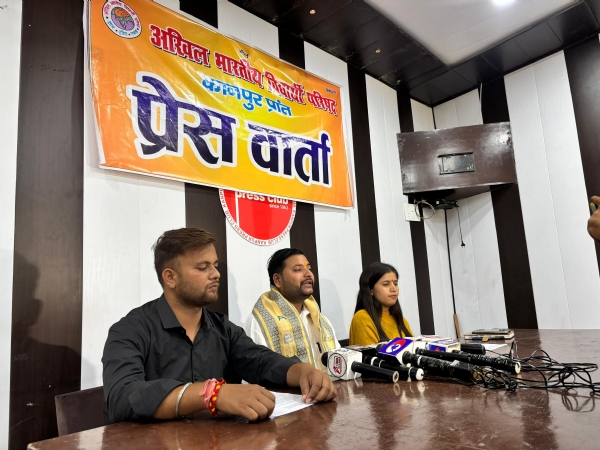
ABVP
to Meet 'MISA' Detainees on the 50th Anniversary of Emergency
ABVP
Pioneers Innovation in Raipur, Conducts Decisive Discussions on National
Education Policy and Internal Security
A
Triad of Struggle, Respect, and Reform – Student Council to Launch Campaigns
Focused on Birsa Munda, Rani Abbakka, and Hostel Surveys: Ankit Shukla
Kanpur,
04 June (HS): The National Executive Council meeting of the Akhil Bharatiya
Vidyarthi Parishad (ABVP) was held from May 29 to 31, 2025, at the Krishi
Mandapam of Indira Gandhi Agricultural University in Raipur, the capital of
Chhattisgarh. A total of 478 representatives from across the country
participated in this three-day meeting. Prior to the main meeting, separate
sessions were held on May 28 to review various dimensions of the Parishad, with
over 250 representatives in attendance. On the eve of the meeting, a grand
exhibition was organized, creatively showcasing diverse themes such as
Chhattisgarh's culture, tribal traditions, stories of national valor, the
National Education Policy, the 150th birth anniversary year of Bhagwan Birsa
Munda, the 500th birth anniversary of Rani Abbakka, and the Sangh Centenary
Year.
The
civic felicitation ceremony on May 28 saw Vishnu Deo Sai, Chief Minister of
Chhattisgarh, as the chief guest, and Saint Shri Balayogeshwar Rambalak Das
Mahatyagi as the special guest. Distinguished citizens of Raipur, former
members of the Parishad, and all members of the welcome committee, including
its president and secretary, were also present.
On
May 29, the inaugural session of the National Executive Council meeting was
formally commenced by lighting the lamp by ABVP National President Prof.
Rajsharan Shahi, National General Secretary Dr. Virendra Singh Solanki, and
National Organizing Secretary Ashish Chauhan. On the final day of the three-day
meeting, a special lecture on Future India Through Languages was
delivered by linguist Shri Chamoo Krishna Shastri, who emphasized the need to
create an ecosystem for the preservation and widespread use of Indian
languages.
During
the three-day meeting, four key resolutions were passed: a demand for policy
formulation to regulate and control coaching institutes, concern over delays in
the appointment process of Vice-Chancellors in universities, and discussions on
India's internal security and global standing. ABVP praised the courage and
strategic skills of the Indian armed forces in the recent 'Operation Sindoor'
and 'Operation Kagar,' expressing unified support for India's security forces.
The
meeting discussed various pressing issues related to student welfare and
finalized the roadmap for upcoming programs. To commemorate the 150th birth
anniversary year of Bhagwan Birsa Munda, various programs based on his life and
contributions will be organized, including an all-India hostel survey,
publication of books, and programs involving worship with soil from his
birthplace and commemorative journeys. Various events are also planned to
celebrate the 500th birth anniversary of Rani Abbakka. In connection with the
50th anniversary of the Emergency, from June 25 onwards for the next two years,
dialogues with former workers and MISA detainees, rallies, and remembrance
programs will be organized in university campuses. For Yashwantrao Ji's birth
centenary, programs like former worker gatherings, study camps, speeches,
exhibitions, and literature creation will be held at provincial centers.
Additionally, with the RSS Centenary Year in mind, special attention will be
given to organizational expansion and work quality, and a resolute campaign
will be launched with the call for 'Panch Parivartan' (Five Transformations).
A
notable feature of this meeting was the experimental effort made from an
environmental perspective. The organisation adopted a 'Zero Food Waste' policy,
distributing food waste in service settlements and converting organic waste
into compost. Instead of plastic name tags, name tags made from cow dung were
used at the event. This meeting proved instrumental in further strengthening
ABVP's role as an organization committed to education, nation-building, and
student welfare.
Addressing
the press conference, National Secretary of ABVP Ankit Shukla stated,
Presently, with over 6 million members, the Akhil Bharatiya Vidyarthi
Parishad has become an organization that has gained acceptance among students
and youth through its working style. The organization has carried out
influential programs at various levels, undertaking constructive activities on
subjects such as education, environment, sports, entrepreneurship, and social
harmony. ABVP is currently not only expanding its organization but also
building youth who are dedicated to the nation, ideologically aware, and
socially responsible. ABVP is leading the ideological struggle to defeat the influence
of left-wing ideology in universities. India's strong response to recent
terrorist incidents has boosted confidence and national pride among the youth.
Education needs to be a medium not just for knowledge, but for character and
nation-building; the National Education Policy is a positive initiative in this
direction. The environmental initiatives implemented in the Raipur meeting,
such as plastic-free campus, zero food waste, and organic waste management,
prove that ABVP is an innovative and responsible student organization. This
meeting has been historic in terms of ideas, discussions, and future
plans.
Shivraje
Bundela, ABVP Kanpur State Secretary, said that ABVP has been the world's
largest far-sighted, nation-friendly student organization, continuously working
for student welfare since its inception. In the changing environment today, the
ABVP stands strong in every campus through its constructive and programmatic
activities. As a result, ABVP's membership has now exceeded 6 million. ABVP is
raising its voice on major national issues today, be it education, health,
social issues, or matters of national interest and security. Today, it has
become an organization that gives its clear reaction to every issue.
Hindusthan Samachar / Abhishek Awasthi





